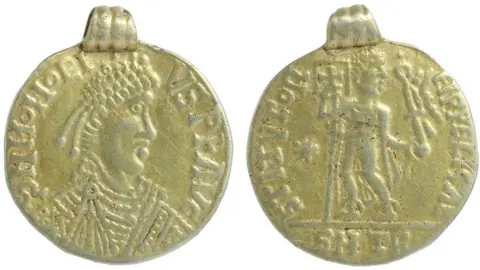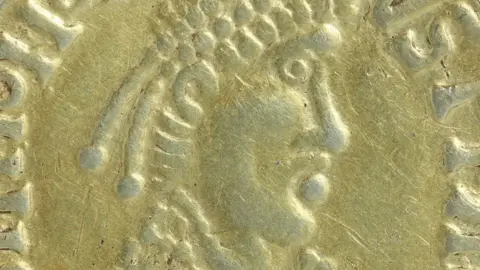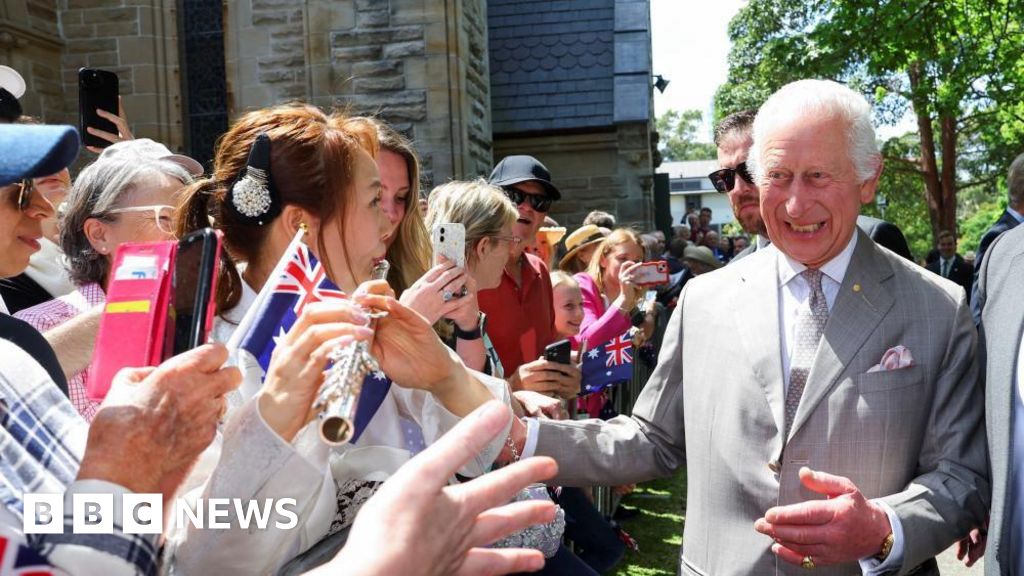
 Andrew Williams/Norfolk County Council
Andrew Williams/Norfolk County Council
The early Anglo-Saxon creator was imitating a Roman coin called a solidus, showing the emperor Honorius on one side and a figure holding a banner on the other
A "very unusual" gold pendant made by an early Anglo-Saxon in imitation of a Roman coin has been discovered by a detectorist.
The replica is a copy of a solidus coin showing the emperor Honorius (AD393-423) on one side and a figure holding a banner with Christian symbols on the other.
The late 5th to early 6th Century pendant was created at a time when Anglo-Saxons were pagans, which was "slightly ironic", said coin expert Adrian Marsden.
The find was discovered in a field near Attleborough, Norfolk, in January 2023, and has been declared treasure by a coroner.

 Adrian Marsden
Adrian Marsden
Numismatist Adrian Marsden thinks it belonged to someone with "quite a bit of wealth" and may have been part of the owner's grave goods
Dr Marsden, from the Norfolk Historic Environment Service, said this was an era when the Roman Empire, which had become officially Christian by AD380, was "in freefall".
"We know the Anglo-Saxons of this period are pagan and they are moving in and starting to take over the whole of England, mainly in the east at this moment," he said.
"It's slightly ironic, these people are definitely not Christian, yet they are copying a Christian image - the moot point is if they understood the imagery - and they blundered the lettering, so they're certainly not literate."
Anglo-Saxons began to arrive in England in small numbers from AD410, and by AD500 were being fiercely resisted, in a period which used to be known as the Dark Ages, but is now called early medieval by historians.
The "garbled" lettering around the emperor's image reads D N HONORIVS P F AVG and was "more-or-less accurate", the numismatist added.
On the other side of the 23mm (0.9in) long by 20.2mm (0.8in) wide pendant can be seen a figure holding a banner with a cross design.

 Andrew Williams/Norfolk County Council
Andrew Williams/Norfolk County Council
Honorius became sole ruler of the Western Roman Empire aged 10 and had to flee Rome when the Visigoths occupied the city in AD410
Dr Marsden said such imitations were "very unusual".
"We see Roman gold coins being repurposed as coins, occasionally with very similar suspension loops, but here they've made the whole thing from scratch," he said.
Despite the collapse of the empire, the Anglo-Saxons would have come across many impressive Roman buildings, as well as coins and artefacts, and that may be why they want to copy something "so distinctly Roman".
He also suggested the pendant could have been part of a burial, rather than having been lost, indicating it came from the owner's grave which was ploughed up over the centuries until it finally rose close enough to the surface for the detectorist to find.
It is believed a museum plans to acquire the object.

 2 settimane fa
6
2 settimane fa
6















 English (US) ·
English (US) ·